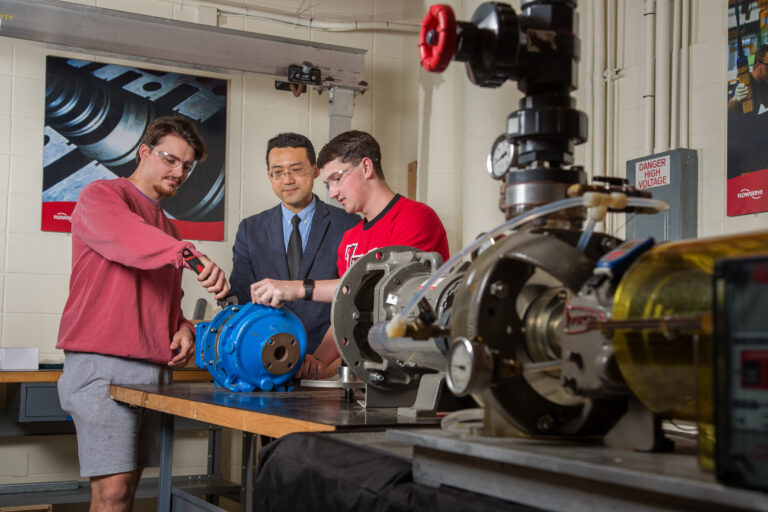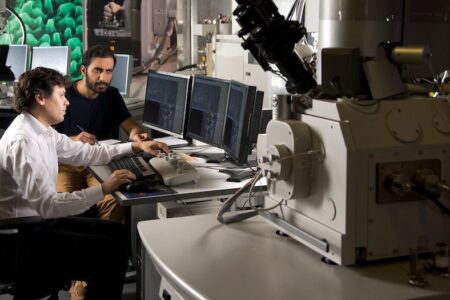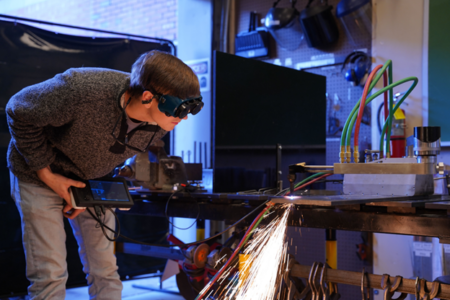
Artificial intelligence (AI) has become a game-changer across multiple industries — think global healthcare, education, manufacturing, and more. Once a futuristic concept, it is now a key part of everyday life, driving innovation and reshaping how we work, learn, and connect. And its momentum shows no signs of slowing.
If predictions are to be believed, these technologies will transform every single corner of our lives, fueling industries eager to scale and innovate. This makes now the perfect moment to position yourself as a leader in this cutting-edge technology. For engineers, the opportunities are limitless — what better way to harness AI’s power than by designing and building the innovations that keep our world connected and thriving?
The answer lies in an advanced degree, such as those offered by these leading universities.

Small class sizes and a low student-to-faculty ratio allow students to build meaningful relationships with expert faculty. Source: Lamar University
Lamar University, College of Engineering
The best education is one that delivers exceptional value. Lamar University’s College of Engineering does exactly that – according to Payscale.com, it’s the third-best engineering school in the nation for return on investment. Pair that with cutting-edge courses and competitive scholarships, and you have yourself an effective launchpad to 21st century success.
The college is home to five departments specialising in chemical engineering, civil and environmental engineering, electrical engineering, industrial and systems engineering, and mechanical engineering. Each offers ABET-accredited programmes that can prepare you to address global engineering challenges. To further guarantee your career readiness, the college is now offering courses integrated with AI that are fully aligned with current market demands.
“Artificial intelligence is impacting how we interact with the world dramatically day to day. Including artificial intelligence in the curriculum will prepare our students for their future careers,” says Dr. Yueqing Li, Associate Professor of Industrial and Systems Engineering.
Recently developed courses specifically cover sensor systems, data analysis, software development, and other core AI-based skills. Even the college’s Department of Industrial and Systems Engineering, for example, has fully embraced AI and robotics as fundamental tools for problem-solving, lacing principles across their curricula. Standalone AI-focused offerings are available now, too — you could pursue foundational courses in AI, software development, and machine courses offered by the Computer Science Department and the College of Business.
Regardless of your route, you will gain practical experience applying your newfound knowledge to manufacturing, quality control, reliability, safety, and supply chain management. You’ll learn to identify AI solutions for everyday industrial engineering tasks, including software development, quality control, data cleaning, data analysis, reviewing text records, automating business processes, and writing reports.
Recently, doctoral students have even used AI to predict equipment failure, analyse free response survey data, and identify the use of Personal Protective Equipment. Meanwhile, master’s students have explored document generation and natural language processing of text data.
Learn about Lamar University’s College of Engineering.
The University of Arizona
Established in 1885, the University of Arizona is known for producing real-world-ready graduates. By improving lives in the state of Arizona and beyond through meaningful teaching, research, service, and innovation, the university has earned a reputation for being a place with no limits.
Its College of Engineering promises equally endless possibilities. You’ll be surrounded by a diverse and supportive academic environment set on a stunning, student-centred campus. Its graduate programmes, ranked in the top 50 nationwide, with five programmes placing in the top 25%, are known for being among the best in the country.
The college’s two newest academic programmes are no exception. Students get industry-aligned, hands-on experience developing technology for an increasingly connected world, developing the knowledge and skills needed for careers in critical areas such as healthcare, space exploration, communications, transportation and cybersecurity.
You could pursue a BS in Computer Science & Engineering, honing your expertise in multidisciplinary engineering technologies while pushing the limits of what can be achieved in fields like artificial intelligence, quantum computing, cybersecurity and robotics. Meanwhile, the BS in Software Engineering combines interdisciplinary learning with real-world design and modern methodologies like Agile, automated testing, and DevSecOps, preparing you for high-demand roles across industries like aerospace, automation, biomedical technology, and more. Both routes encourage mastery of engineering problem-solving and emphasise hands-on work from day one.

The Faculty of Science and Engineering at the University of Bristol is home to nine specialised schools. Source: University of Bristol
University of Bristol
The University of Bristol is ranked 54th globally, according to QS World University Rankings 2025. The university prides itself on being at the cutting edge of global research – engineering, especially, stands out for its commitment to producing the leaders and entrepreneurs of the future. Pursuing a degree here positions you right in the home of the world’s first multi-million-pound national facility for AI discovery, mastering the ins and outs of emerging technologies and the industries that require its use.
Here, you’ll learn to advance knowledge and technological innovations needed to address current global challenges. Explore courses in artificial intelligence tailored to address the surging demand for graduates who are skilled in the fundamentals of AI; learn to design and build, secure and trustworthy AI systems that help make our world a better place in a school lauded for its prowess in artificial intelligence research and education – these factors cement its status as an AI University of The Year.
Another standout factor is the school’s strong industry connections. Students here have the opportunity to learn from world-class engineering and tech companies, establishing industry connections from day one. With its status as a Russell Group institution, the University of Bristol is recognised as one of the most esteemed higher education providers in the UK and remains proud of its interdisciplinary culture and lasting global partnerships with industry.
Hence, its graduates emerge as versatile AI engineers with robust mathematical and extensive problem-solving skills, unlocking doors to diverse career paths across the fields of robotics, healthcare, finance, engineering design and manufacturing, and sustainability.
*Some of the institutions featured in this article are commercial partners of Study International










